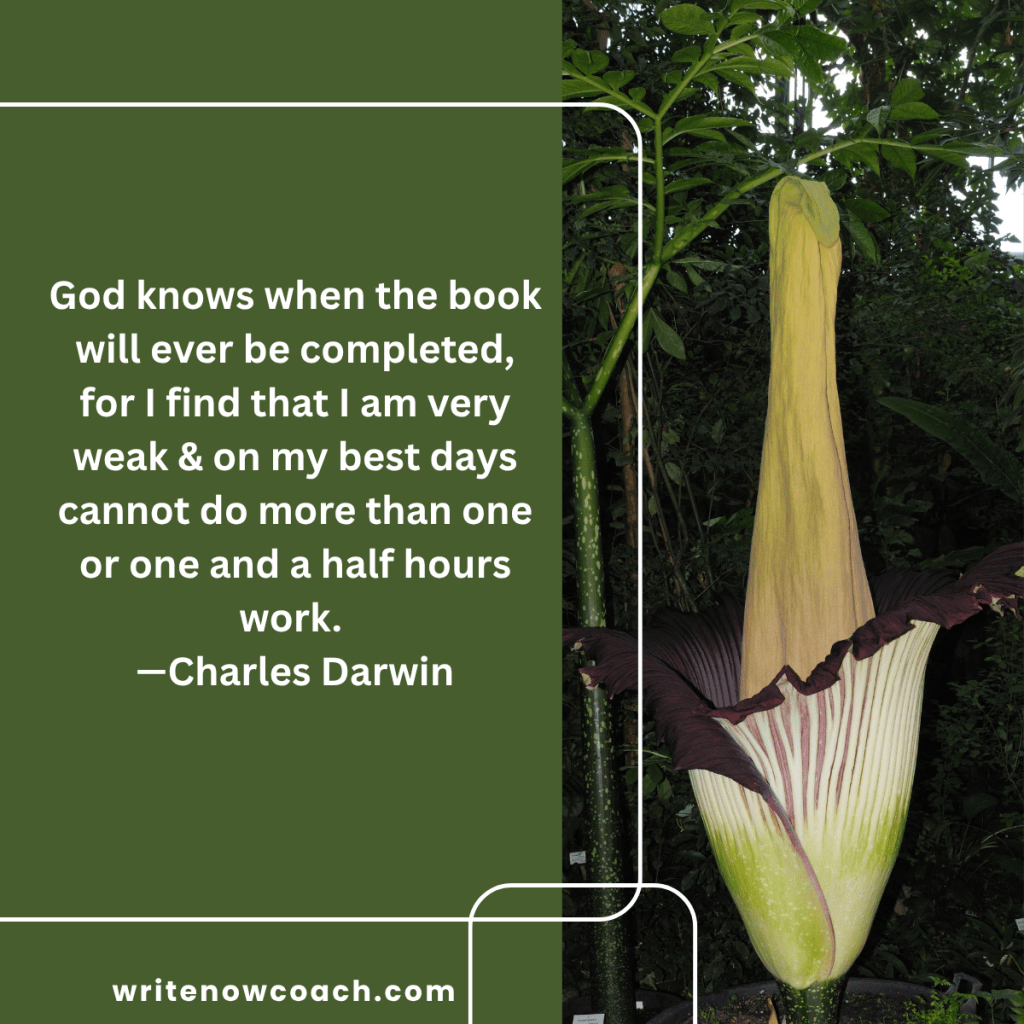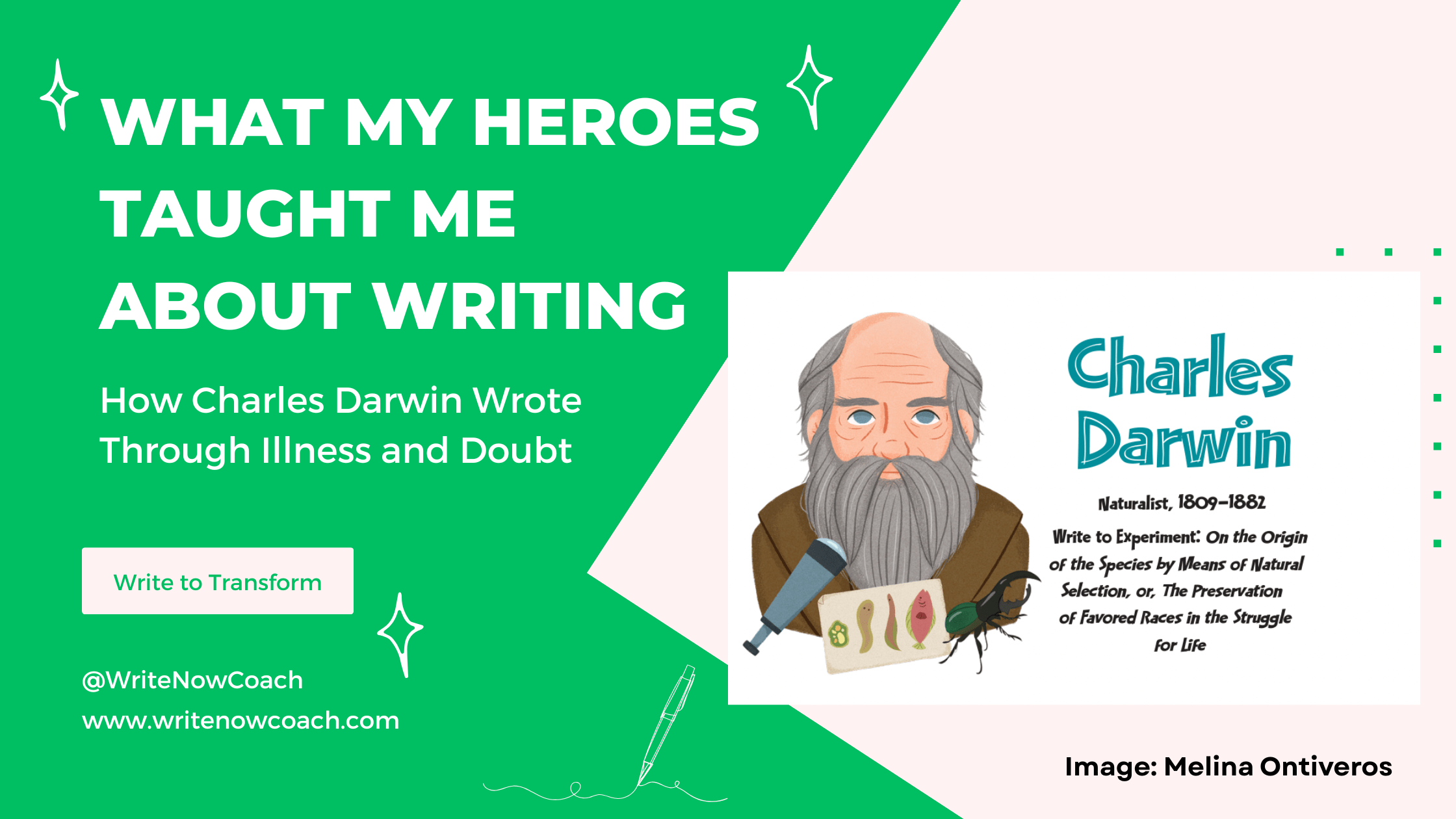What My Heroes Have Taught Me About Writing: Charles Darwin
by Rochelle Melander
When Charles Darwin published On the Origin of the Species in 1859, the library at Trinity College, Cambridge—where Darwin had attended college—banned his book immediately. In 2019, On the Origin of the Species was named the most influential banned book of all time. That’s an amazing legacy, considering Darwin came close to not even publishing the book.
Why did he struggle?
When Charles Darwin was gathering evidence for his big idea—natural selection—he was pulled in many directions.
He worried his work would upset his religious family and be criticized by the church, so he sought additional proof. He wrote in his autobiography, “Here, then, I had at last got a theory by which to work; but I was so anxious to avoid prejudice, that I determined not for some time to write even the briefest sketch of it.”
He was hampered by his health issues. He said this in a letter to his friend J.D. Hooker,
God knows when the Book will ever be completed, for I find that I am very weak & on my best days cannot do more than one or one and a half hours work.

And then there were the kids! They often interrupted his work, asking him for paper, string, pins, and scissors. They even drew on discarded pages of his work. (You can see them here. https://www.amnh.org/research/darwin-manuscripts/surviving-pages-from-the-first-draft-of-the-origin/children-drawings ) In one of his notebooks, he wrote this about Lenny:
Lenny kept on bothering me by asking me over & over again, “where his Picture was”, & at last I scolded him & told him to be quiet, when he immediately asked “but where do you think it is”. And when I said “why Lenny you have asked me again”—he answered in a very injured tone “no I have not, for I have only asked where you thought it was.—”
How did Darwin cope?
Because of all this distraction, Darwin maintained a strict daily routine. After breakfast and a morning walk, he’d work for an hour and a half. He took a break to read and answer letters or listen to his wife reading him a novel. At ten thirty, he’d work on his experiments. After lunch, he wrote more letters, took a walk, and napped. Oh yeah, and he often allowed his children to work beside him in his study. His daily routines soothed and strengthened him—so he almost never left home for meetings or research. You might say that Darwin mastered the work-from-home routine long before we knew it was a thing!
Your turn
You no doubt have many demands pulling you in different directions. Now more than ever, we are distracted by many things. Not just the normal things, like pets and children and work and health. We juggle so much incoming information, it’s a wonder we get anything done. Take a page from Charles Darwin’s life and try this:
Choose work that matters to you. Darwin loved his work, especially when he got to do basic scientific experiments. He wrote in his autobiography: “My chief enjoyment and sole employment throughout life has been my scientific work; and the excitement from such work makes me for the time forget, or drives away, my daily discomfort.” (Life and Letters, Volume 1, p. 65)
Create structure for your day. A to-do list isn’t enough. Get out your calendar and schedule your tasks. Don’t forget to block out time to rest and read.
Set aside blocks of time to write. Even by scheduling fifteen or thirty minutes a day to write, you can write a book that matters. Create a bubble around that time: no email, texts, news, or social media.
Be persistent and patient. Charles Darwin was known for quoting Anthony Trollope’s phrase, “It’s dogged as does it.” You may have days where you feel sick (as Darwin did) and cannot work, or you may have days and weeks when the distractions of politics are just too much. Be patient with yourself. Take the day off and get back to it tomorrow.
Be playful. Author Jane McGonigal talks about how she used gaming to heal from a brain injury. She said, “When we play a game, we tackle tough challenges with more creativity, more determination, and more optimism. We’re also more likely to reach out to others for help.” (SuperBetter, p. 3) Charles Darwin’s son Francis recalled that his father sometimes treated his work with a gameful spirit,
I can recall his appearance as he counted seeds under the simple microscope with an alertness not usually characterizing such mechanical work as counting. I think he personified each seed as a small demon trying to elude him by getting into the wrong heap or jumping away altogether, and this gave to the work the excitement of a game.”
And if you struggle to find time, reach out to me. I created Show Up and Write to give people a time and place to write, away from their busy lives. https://writenowcoach.com/show-up-and-write-writing-circles/
And a final fun fact for readers
Darwin liked a happily ever after ending. He wrote in his autobiography: “I often bless all novelists. A surprising number have been read aloud to me…and I like all if moderately good, and if they do not end unhappily—against which a law ought to be passed. A novel, according to my taste, does not come into the first class unless it contains some person whom one can thoroughly love, and if it be a pretty woman all the better.” (Autobiography, 138-139) There you have it: Darwin liked a romance novel with a HEA ending.

Write Now! Coach Rochelle Melander is an author and ADHD-trained professional certified coach. She helps wildly creative people get stuff done. From writing and publishing books to finishing that work project–she’s got you covered. If you’re struggling to start or finish a project, connect with Rochelle to create a personalized plan for overcoming procrastination, dealing with distraction, and staying focused. Book a private consultation: https://writenowcoach.com/consultation/









